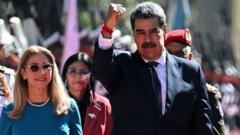The US has announced a significant $25 million reward for information leading to the arrest of Nicolás Maduro, President of Venezuela, on the very day he was sworn into a third six-year term. This inauguration was marred by widespread condemnation from the international community and vehement rebuke from Venezuelan opposition leaders.
In addition to Maduro, the US has incentivized tips for the capture of key figures in his administration, including Interior Minister Diosdado Cabello and Defence Minister Vladimir Padrino, with rewards of $15 million for the latter. The UK also joined this international initiative by imposing sanctions on 15 high-ranking Venezuelan officials, including members of the judiciary and military, labeling them as contributors to "undermining democracy and human rights violations." UK Foreign Secretary David Lammy criticized Maduro's regime as "fraudulent."
Simultaneously, the European Union announced the extension of its restrictive measures, citing a stagnation in efforts towards restoring democratic practices in Venezuela. Canada, too, has enacted sanctions, with Foreign Minister Mélanie Joly decrying Maduro's "shameless actions" against the democratic will of Venezuelans.
The US's reward stems from charges of narcotics and corruption dating back two years, when Maduro was accused of orchestrating a "narco-terrorism" scheme that purportedly inundated the US with cocaine, compromising public health. Maduro has fiercely denied these allegations. In the past year, the US reinstated oil sanctions, intending to pressure Maduro into conducting free and fair elections.
On the occasion of his inauguration, which was cloaked in tight security and media control, Maduro proclaimed his administration would usher in a "period of peace, prosperity, and new democracy," despite international disdain for the July election results. The elections were dismissed by several nations, including Brazil and Colombia, with the US recognizing exiled opposition leader Edmundo González as the true president-elect. In retaliation, Maduro's government issued an arrest warrant for González, offering a $100,000 reward for his capture.
In a broader context, as Maduro's regime continues to face isolation globally, he retains a few allies, primarily from Iran, China, and Russia. Meanwhile, UN Secretary-General Antonio Guterres has urged for the release of all individuals unjustly detained since the elections, highlighting ongoing concerns about human rights and political repression in Venezuela.
In addition to Maduro, the US has incentivized tips for the capture of key figures in his administration, including Interior Minister Diosdado Cabello and Defence Minister Vladimir Padrino, with rewards of $15 million for the latter. The UK also joined this international initiative by imposing sanctions on 15 high-ranking Venezuelan officials, including members of the judiciary and military, labeling them as contributors to "undermining democracy and human rights violations." UK Foreign Secretary David Lammy criticized Maduro's regime as "fraudulent."
Simultaneously, the European Union announced the extension of its restrictive measures, citing a stagnation in efforts towards restoring democratic practices in Venezuela. Canada, too, has enacted sanctions, with Foreign Minister Mélanie Joly decrying Maduro's "shameless actions" against the democratic will of Venezuelans.
The US's reward stems from charges of narcotics and corruption dating back two years, when Maduro was accused of orchestrating a "narco-terrorism" scheme that purportedly inundated the US with cocaine, compromising public health. Maduro has fiercely denied these allegations. In the past year, the US reinstated oil sanctions, intending to pressure Maduro into conducting free and fair elections.
On the occasion of his inauguration, which was cloaked in tight security and media control, Maduro proclaimed his administration would usher in a "period of peace, prosperity, and new democracy," despite international disdain for the July election results. The elections were dismissed by several nations, including Brazil and Colombia, with the US recognizing exiled opposition leader Edmundo González as the true president-elect. In retaliation, Maduro's government issued an arrest warrant for González, offering a $100,000 reward for his capture.
In a broader context, as Maduro's regime continues to face isolation globally, he retains a few allies, primarily from Iran, China, and Russia. Meanwhile, UN Secretary-General Antonio Guterres has urged for the release of all individuals unjustly detained since the elections, highlighting ongoing concerns about human rights and political repression in Venezuela.




















